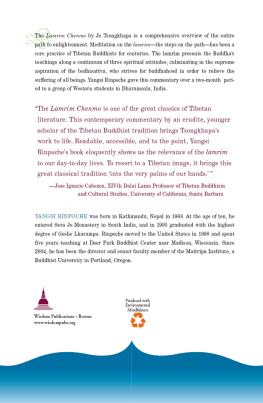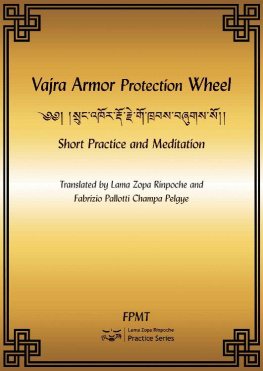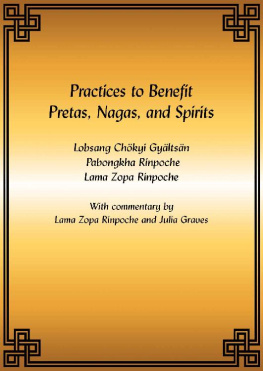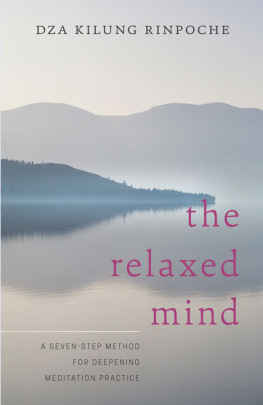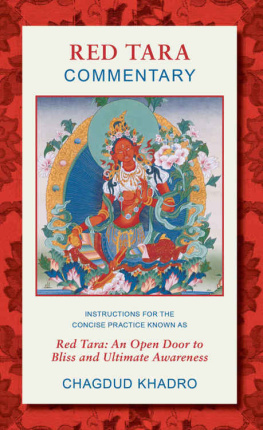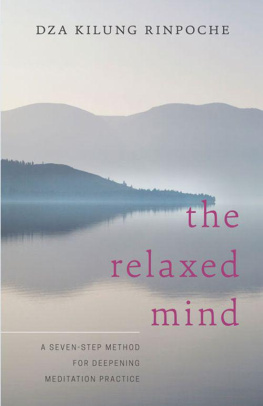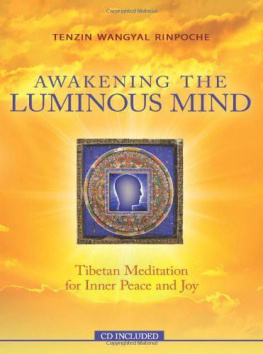Tsoknyi Rinpoche - How Mindfulness Works
Here you can read online Tsoknyi Rinpoche - How Mindfulness Works full text of the book (entire story) in english for free. Download pdf and epub, get meaning, cover and reviews about this ebook. year: 2015, publisher: Parallax Press Moments, genre: Religion. Description of the work, (preface) as well as reviews are available. Best literature library LitArk.com created for fans of good reading and offers a wide selection of genres:
Romance novel
Science fiction
Adventure
Detective
Science
History
Home and family
Prose
Art
Politics
Computer
Non-fiction
Religion
Business
Children
Humor
Choose a favorite category and find really read worthwhile books. Enjoy immersion in the world of imagination, feel the emotions of the characters or learn something new for yourself, make an fascinating discovery.

- Book:How Mindfulness Works
- Author:
- Publisher:Parallax Press Moments
- Genre:
- Year:2015
- Rating:4 / 5
- Favourites:Add to favourites
- Your mark:
- 80
- 1
- 2
- 3
- 4
- 5
How Mindfulness Works: summary, description and annotation
We offer to read an annotation, description, summary or preface (depends on what the author of the book "How Mindfulness Works" wrote himself). If you haven't found the necessary information about the book — write in the comments, we will try to find it.
Abstract: To truly be happy, we must extend ourselves beyond our own comfort zone to include all beings in our practice. Tsoknyi Rinpoche shares stories, commentary, and a guided meditation to help us achieve this
How Mindfulness Works — read online for free the complete book (whole text) full work
Below is the text of the book, divided by pages. System saving the place of the last page read, allows you to conveniently read the book "How Mindfulness Works" online for free, without having to search again every time where you left off. Put a bookmark, and you can go to the page where you finished reading at any time.
Font size:
Interval:
Bookmark:

Contents
EVERYWHERE I GO LATELY, people seem more anxious and afraid, preoccupied with disturbing news streaming in from many different areaspolitical, economic, social, and environmental. Some people Ive met are affected very personally by difficulties that seem to have struck all at once. Theyve lost their job, lost their home, or been stricken by a health crisis; their family members or close friends have been affected by one or another of these crises. Still others have been dealing with health or financial problems for a long time and are feeling burned out.
In difficult times, it can be hard to imagine that anything can make things better. Quite often, when the coping skills and techniques that people learned as children or that are already established in their own culture no longer seem to help, they look for other options. In some cases they turn to the Dharmawhich is a very small word for a very big set of insights and practices introduced to the world twenty-five hundred years ago by the Buddha Shakyamuni, which have been refined and extended since then by sincere practitioners and great masters over much of Asia and, more recently, in the West.
For newcomers to these insights and practices, the main question I encounter is, Does the Dharma work? Of course, the question is phrased differently by different people, but I think the essential meaning is the same: Can these insights and practices actually help us achieve an enduring sense of well-being and engender the confidence and courage for us to expand beyond our comfort zone and have a positive impact on the world around usand if so, how?
On a purely personal level, based on my own experience and on seeing the effects of the Dharma on the lives of individual students around the world, I can say, Yes, the Dharma works. It provides the causes and conditions for enhancing our personal sense of well-being and gives us relief from many of the difficulties that we face in our daily lives. Through listening to and contemplating the teachings and applying them in our everyday lives, we know how to deal with problems when they arise. We understand that when disaster strikes or a challenge occurs, it is the effect of karmawhich may be understood on its simplest level as the consequences of actions we have taken in the past. We understand that samsarathe negative or limiting point of view that we have been trained to accept about life in general and our own life in particularis conditioned by crises of all different kinds. That understanding can help us to face whatever difficulties we have with a certain degree of calmness and courage. Through various meditation practices, we can transform difficult emotions, learn to let go of our fixations, and experience a sense of personal happiness and peace.
But although practicing meditation can help us feel happier, practicing for the sake of achieving personal happiness is a little self-centered. Bound up in it is an element of hope that our happiness will last. We believe that even when new challenges arise, well be able to handle them and maintain our personal sense of well-being and security. Deep down, were aware that whatever happiness, whatever well-being or peace weve achieved is temporary; so along with hope we experience the fear that maybe we wont be able to manage the next crisis or that some person or event will disrupt our sense of personal contentment. As long as our focus remains on achieving and maintaining personal happiness, a true, lasting experience of well-being eludes us.
The initial question, of whether the Dharma works to ease our suffering, could be rephrased a little bit: Are we working the Dharma? The purpose of the Dharma is not simply for us to achieve personal happiness or personal liberation from suffering, but to relieve the suffering of all living creatures, to liberate all beings from the pain and difficulties of samsara.
I had heard this many times as a child, surrounded by family members and other adults who were dedicated practitioners of the Dharma; it was emphasized continuously during my own years of training. But it didnt become real to me until a few years ago when I was in Bodhgaya and realized that while I was pretty comfortable in my own practice, I still wasnt completely comfortable in my own skin. Little things still irritated me; I tired easily; I found myself wrestling between my obligations as a teacher and my desire to spend more time practicing alone or relaxing with my family and friends.
For a few days, I scanned my moods, my emotions, my reactions and compared what I discovered with what I had seen in the great teachers who had influenced my lifeincluding Dilgo Khyentse Rinpoche, Adeu Rinpoche, and my father, Tulku Urgyen Rinpoche. These teachers were always the same, in every situation. Whether relaxing in their own rooms or teaching large crowds or answering questions from a handful of students, they maintained the same motivation: the desire to help all beings everywhere, in any way they could, regardless of whatever demands were placed on their time and energy. Their entire lives were motivated by a deep and unwavering compassion that is the core of the Dharma, the very heart of the Buddhas teachings, and the aim of all Buddhist practice.
UPGRADING OUR PRACTICE
When the Buddhadharma came to the West around fifty years ago, the development of compassion was one of its central teachings. But over the years, some of the emphasis has been lost or diluted. Compassion has become more of a nice idea than an actual effort. We make aspirations for all sentient beings to be happy and to be free from suffering. We sit on our cushion practicing tonglen (a meditation practice during which, as we inhale, we visualize ourselves taking in all the suffering or despair of other sentient beings; and as we exhale, we send out to them all of our own experiences and qualities of well-being, joy, compassion, and courage) for a while and feel very good about ourselves; and yet we completely ignore the fact that the person who was the object of our meditation really needed us to drive them to a doctors appointment. We extend ourselves only so far as it doesnt intrude upon our own comfort zone.
As long as we continue to practice in that way, well still be disturbed by all sorts of political, economic, and social challenges as well as by our own personal crises. To use a modern technological term, we need to upgrade our practice. If we want to truly be happy, to truly be free, we have to extend ourselves beyond our comfort zone, to all beings, in all situations, whether were comfortable doing so or not. We have to move beyond considering Dharma practice to be, as one person described it, a self-improvement project, and recognize that the essence of the Dharma is improvement of the welfare of all beings. One of the great benefits of upgrading our practice in this way is that we develop greater confidence in facing situations that might appear scary, uncomfortable, or inconvenient; we develop the guts to deal with whatever challenges life hands us.
A QUESTION OF FAITH
When youre raised in a culture in which the Dharma is deeply embedded, the question of whether it works or not rarely comes up. There are so many great examples of men and women who have achieved an extraordinary depth of tranquility and extended themselves tirelessly on behalf of others, even in the face of tremendous adversity.
One of my teachers, Adeu Rinpoche, endured fifteen years in a prison camp in Tibet, suffering terrible privations and humiliations; yet he emerged from that experience with his patience, compassion, and generosity intact. Adeu Rinpoche has simply said that his years in prison (where he met many other learned masters) were in fact an extraordinary opportunity to practice. But for those of us who didnt grow up surrounded by the teachings, some faith is necessary.
Next pageFont size:
Interval:
Bookmark:
Similar books «How Mindfulness Works»
Look at similar books to How Mindfulness Works. We have selected literature similar in name and meaning in the hope of providing readers with more options to find new, interesting, not yet read works.
Discussion, reviews of the book How Mindfulness Works and just readers' own opinions. Leave your comments, write what you think about the work, its meaning or the main characters. Specify what exactly you liked and what you didn't like, and why you think so.



